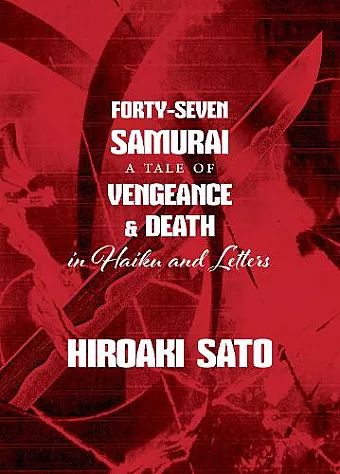Forty-Seven Samurai
A Tale of Vengeance & Death in Haiku and Letters
Format:Paperback
Publisher:Stone Bridge Press
Published:9th Jan '20
Should be back in stock very soon

One of the most spectacular vendettas ever: the history and haiku behind the mass-suicide featured in the 2013 film 47 Ronin
A remarkable and true tale of loyalty, vengeance, and ritual suicide. . . . In the spring of 1701, the regional lord Asano Naganori wounded his supervising official, Kira Yoshinaka, during an important ceremony in the ruling shogunate's Edo Castle and was at once condemned to death. Within two years, in the dead of winter, a band of forty-seven of Asano's retainers avenged him by breaking into Yoshinaka’s mansion and killing him. Subsequently, all the men were sentenced to death but allowed to perform it honorably by seppuku.
This incident—often called the Ako Incident—became a symbol of samurai honor andat once prompted stage dramatization in kabuki and puppet theater. It has since has been told and retold in short and long stories, movies, TV dramas. The story has also attracted the attention of foreign writers and translators. The most recent retelling was the 2013 Hollywood film 47 Ronin, with Keanu Reeves, though it was wildly and willfully distorted.
What did actually happen and how has this famous vendetta resonated through history? Hiroaki Sato's examination is a close, comprehensive look at the Ako Incident through the context of its times, portraits of the main protagonists, and its literary legacy in the haiku ofthe avengers. Also included is Sato's new translation of Akutagawa Ryunosuke's short story about leader Oishi Kuranosuke as he awaited sentencing.
"One of Japan’s most sprawling and endlessly intriguing of bloody epics... Hiroaki Sato weaves a rich portrait of a paradoxical society governed by value systems vastly different to our own."
—Damian Flanagan, The Japan Times
“The vengeance of the Forty-Seven Samurai ended in an early-morning flash of violence and bravado. This book is the scaffolding under that flash. Here are the warring claims to how the incident came to pass; here are contemporary accounts, but also the vivid poems, plays, stories and penal codes that have been revivifying that legend in the centuries since.”
—Forrest Gander, Pulitzer Prize-winning author
"Hiroaki Sato, a poet, author of Legends of the Samurai (where he first retells this story) and the PEN award-winning translator of many Japanese writers including Princess Shikishi, Yukio Mishima and Kenji Miyazawa, does something which others have not attempted, namely to provide more than just an accurate historical account of the event and its aftermath. Sato allows the participants to speak in their own words through their own haiku and letters, which immediately renders them three-dimensional and thoroughly human."
—The Asian Review of Books
"A striking mosaic of original source materials. By creating a Rashōmon Effect with his multi-faceted approach Sato deepens the mysteries of the 47 Rōnin Incident."
—Doris G. Bargen, Author of Suicidal Honor
"Sato enlightens his readers, in English, on Japanese customs and culture relative to the incidents of the 47 Ronin with history, correspondence, and poetry, which may be unknown even to the Japanese people."
—Prof. Allan Sosei Palmer, Urasenke Chanoyu, Kyoto, Boston
“The pre-eminent translator of Japanese poetry in our time...possessed of an unfiltered enthusiasm and spontaneity.”
—August Kleinzahler, London Review of Books
“Over the last four decades, English-speaking aficionados of modern Japanese literature have delighted in the numerous translations, both of prose and poetry, undertaken by the masterful hand of translator, essayist, and poet Hiroaki Sato.”
—Meera Viswanathan
ISBN: 9781611720549
Dimensions: unknown
Weight: unknown
280 pages